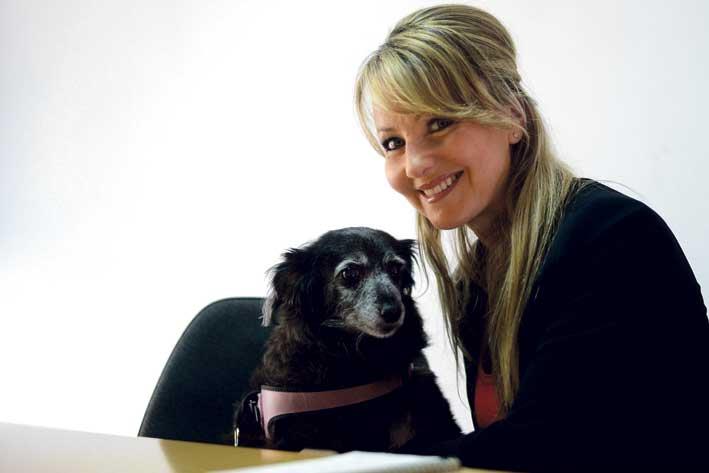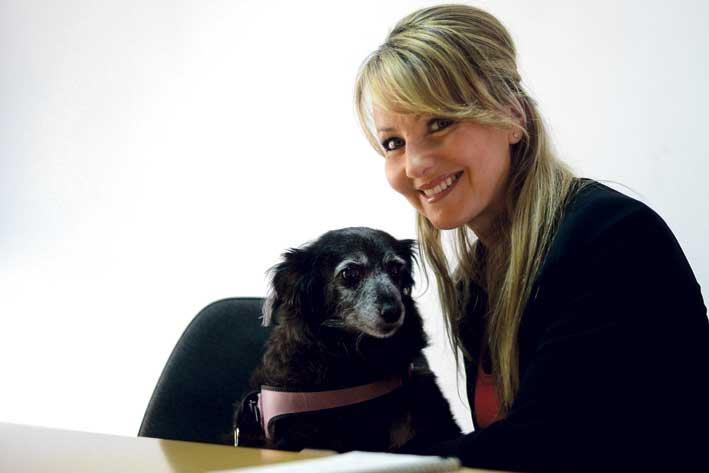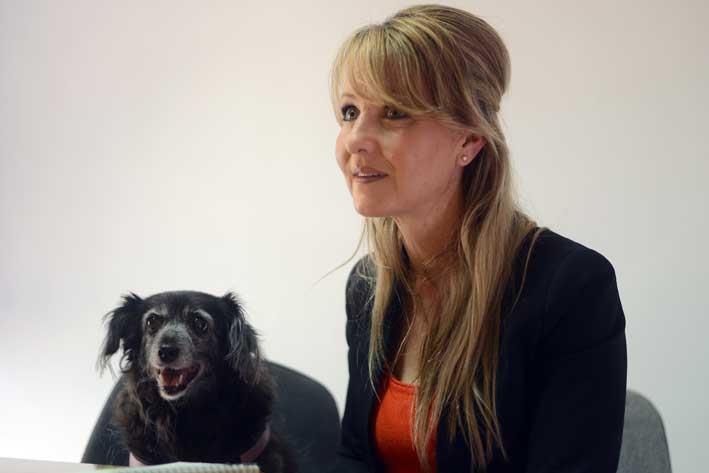Next Sunday’s silent protest against animal cruelty is not a political activity and is aimed at conveying the message that animal welfare laws are useless if not backed up by proper enforcement.
The event is being organised by well-known TV presenter and animal rights activist Moira Delia, who says the rally has been a long time coming.
“The demonstration is not just about the recent horse abuse case. The aim is to get animal lovers to join forces and convey the message that things need to change, that enforcement is needed.” The silent protest will start at 10.30am near the Love monument in St Julians. “It is a silent protest. With the help of the media we can be the voice of the voiceless animals, who often suffer in silence.”

Mr Delia says she is tired of forwarding complaints of animal cruelty to the Animal Welfare Department only to be told that everything is in order and no action is needed. “I get all sorts of calls from morning to evening. I get people complaining about other people leaving dogs chained up in the sun. So how can the AWD people never find anything wrong? The number of reports I receive is increasing and I forward all of these complaints to the relevant authorities but it stops there.”
Horses’ suffering in the sun
Ms Delia says she could not bear to watch the recent video of a man whipping his horse after the animal collapsed on the road near Swatar. “I am not an expert and I understand that there is a particular way to get horses to get up on their feet again but the method used was, in my opinion, inappropriate. The owner should have realised that the animal did not have a proper grip on the slippery tarmac and could also have asked people to help.”
Whipping horses is not the only form of cruelty. “Summer is approaching. Horses will be left in the sun in the afternoon and horse shelters will remain empty, or serve as car parking spaces. What will we be doing about this?”
Ms Delia says Transport Malta was working on new laws regulating the use of horses on the roads but it seems that the issue was not properly addressed. “These horses cannot be taken off the road completely. They need to be exercised. But we cannot have horse-drawn karozzini on the roads in the middle of the afternoon during the summer months. They need to put more effort in and make it clear that horses cannot be out in the sun between noon and 4pm. They should be kept in the shade during that period. We thought they (TM) would seriously consider this.”

‘Zoos’ have cages, not enclosures
Turning to the issue of wild animals and the so-called “zoos,” Ms Delia says these are nothing more than animals locked up in cages. “Personally I find nothing beautiful in seeing animals in a cage. I thought we had made a step forward when Malta banned animal circuses but it seems we have made ten steps back with the opening of all these animal “zoos”, where there is no enforcement. Even if new laws protecting wild animals will shortly be introduced the fact remains that we will also lack enforcement on this matter.
“I once attended a Gvern li Jisma’ event and asked Parliamentary Secretary Roderick Galdes whether the government, seeing that it was planning on banning circuses, would now be allowing animal ‘zoos’ to sprout up everywhere. He said no, they will be controlled as well. Well, they have not. Besides, what will happen if these places run into financial trouble?”
There is also the issue of the stress caused to animals by being locked up. “It does not really surprise me to hear that a wild animal has attacked someone. Unfortunately I think that we should expect worse cases. These animals are clearly showing that this is not their place. They need to be free, in the wild. Don’t believe that these animals are bred in captivity either – it’s an excuse. Release them in the wild if you want to see if they would survive. That is what they are doing abroad. When zoos abroad close down the animals are sent to wildlife parks and manage to integrate fully in their new surroundings.”
She also criticised school visits, saying that this went contrary to their own teaching – that wild animals should live in the wild. “This is not just about lions and tigers. It is also about the dolphin park – which is essentially a few dolphins living in a pool.” Mr Delia says dolphins often commit suicide in such parks.
“We need one good, independent animal behaviourist in Malta.” She recalled an experience when she had the misfortune of seeing a tiger living in one of Malta’s “zoos.” “The tiger was just walking around in a figure of eight, which is a clear sign of depression. The attendants there hadn’t the slightest idea of this.”

Illegal hunting
Another topic of concern for Ms Delia is illegal hunting. A number of protected birds have been shot down in the last few days. Ms Delia was one of the main spokespeople in last year’s anti-spring hunting referendum campaign. Birdlife Malta recently said it was mulling another referendum bid. Would she consider taking part again, we asked. Ms Delia says she prefers not to comment since it is still early days and she does not wish to speak on behalf of Birdlife Malta. But says she would definitely give a helping hand. “I will definitely not keep my mouth shut when it comes to illegal hunting. The hunting season opens on Sunday and we need more enforcement. The number of calls related to hunting has doubled in the past few weeks. Should this be the case? Should it be the people who report these illegalities?” She agrees that enforcement resources have been reduced (the police’s ALE section was reportedly cut down). “I can see this from the sheer number of reports I receive. They keep telling me that nothing is being done.”
AWD needs more resources, training and power
Ms Delia says the Animal Welfare Directorate does not only need more people and resources but also officers who are truly passionate about animals. “You will remember the case of the dog that drowned after officers refused to jump in the sea to save her. I will never forget that case.”
Again, enforcement is the key. “The AWD speaks of the famous five freedoms and tell you in their booklets that dogs cannot be left in miserable conditions. So why is it that every time we report such a case they tell us that nothing can be done, or that everything is in order? These owners are supposed to have their dogs taken away and placed in care yet nothing of the sort happens.”
Another concern is the lack of an AWD section in Gozo. “I receive a lot of reports from Gozo. The AWD is badly needed in Gozo – until then one cannot do much.”
She also criticised the AWD for giving up dogs for rehoming without neutering them. “Why do we get foreign vets over to carry out neutering campaigns if the state department itself gives out unneutered dogs? It makes no sense.”

Animal Welfare law can be better
So is the current Animal Welfare Law any good? “It can always be better but the key is enforcement. One of the five freedoms says, for example, that you cannot leave a dog exposed to the elements. But it should also state, clearly, that you cannot leave dogs on a roof or chained up. After all, why should anyone own a dog only to keep it chained up and out of sight?”
While the concept of microchipping was largely positive, there are still serious shortcomings. “Many microchips are not registered and many dogs are still not microchipped. We have a particular case where the registered owner of a dog cannot be traced. People who fail to microchip their dogs should face fines and penalties. That is the only way people will learn.”
She also insists that the Maltese authorities would do well to learn from foreign entities. The UK RSPCA, she says, is a good model. “Their officers are well trained and, when they encounter cases of neglect or abuse they have the power to take an animal from its owner and take it to the vet for treatment. That is proper enforcement. I hope we get there someday. Officers need bigger enforcement powers. I was once told that they were working on giving animal welfare officers new powers, such as the power to enter a property. With the current system the police have to be involved and it becomes a long process.”

Dog adoption on the rise
People are resorting more and more to adopting, rather than buying dogs. “I have nothing against people who buy purebreds. The important thing is to check that the parents have been tested for genetic problems. The problem is that we have around six sanctuaries which are full. In my case the dogs find me, not the other way round. And the more unfortunate they are the more I am willing to take them in.”
She also insists on the need for more control on dog breeders. “This is a huge underlying problem which is not being addressed at all. There are breeders who carry out inbreeding, with all the problems that this creates. The only thing they see is the money. There was supposed to be a law to regulate breeders. Having said that, there are several responsible dog breeders.”
We also asked about the upcoming pet cemetery initiative. Many regard it as a very positive initiative but are there bigger priorities in animal welfare? “For those who lose their beloved pets it is definitely a big priority. Up to now there is nothing to do but take your pets, considered by many as family members, to the incinerator in Marsa or to find somewhere to bury them. I think animal lovers want the pet cemetery and I look forward to having one at last. But yes, there are many other important issues that need to be tackled.”

Farm animals
Other aspects of animal welfare are less commonly spoken about. These include animal farms. Ms Delia mentions the case of Gianni Attard, the Gozitan sheep farmer whose unregistered sheep are facing a mass cull over public health concerns. She asked whether there was a way to test the sheep and keep them alive if they were cleared. Ms Delia has actually testified in the court case. “I told the court that all the money spent so far on the case could have been spent by the owner to test the animals. I could never support the culling of these animals. I understand that any sick animals would have to be put down but all of them?”
The bottom line is that stronger, in fact much stronger enforcement is needed. “Dogs can only bark but we can be their voice. Animal lovers, all who care about animal welfare and those who work in animal sanctuaries should join us on Sunday so that we make our voices heard. We have to convey the message that we want enforcement – without it laws are useless.”